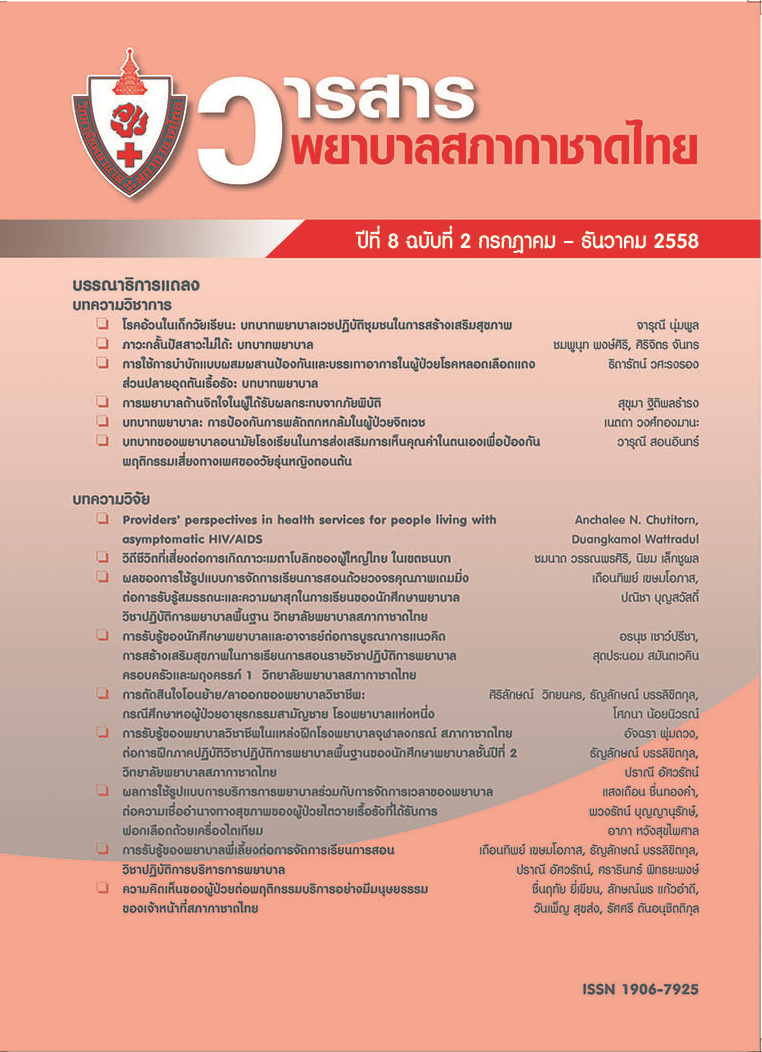ความคิดเห็นของผู้ป่วยต่อพฤติกรรมบริการอย่างมีมนุษยธรรม ของเจ้าหน้าที่สภากาชาดไทย
Keywords:
พฤติกรรมบริการ, มนุษยธรรม, ความคิดเห็นของผู้ป่วย, service behavior, humanitarian, patients’ opinionsAbstract
การวิจัยแบบสำรวจนี้มีวัตถุประสงค์เพื่อศึกษาความคิดเห็นของผู้ป่วยต่อพฤติกรรมบริการอย่างมีมนุษยธรรมของเจ้าหน้าที่โรงพยาบาลสมเด็จพระบรมราชเทวี ณ ศรีราชา กลุ่มตัวอย่างเป็นผู้ป่วยนอก 500 รายและผู้ป่วยใน 600 ราย สุ่มตัวอย่างตามสะดวกเป็นผู้ป่วยที่รับบริการในช่วงเวลาที่ศึกษา โดยใช้แบบสอบถามพฤติกรรมบริการอย่างมีมนุษยธรรมที่ผู้วิจัยสร้างขึ้นมีมาตรวัดแบบลิเคิร์ท มีค่าความตรงของเนื้อหาโดยมีดัชนีความสอดคล้องของข้อคำถามกับวัตถุ
ประสงค์เฉลี่ยที่ 1.9 (SD = 0.3) จากคะแนนเต็ม 2 คะแนน ทดสอบความเที่ยงโดยมีค่าสัมประสิทธิ์ครอนบาคอัลฟาที่ 0.95 วิเคราะห์ข้อมูลโดยใช้ความถี่ ร้อยละ ค่าเฉลี่ยและส่วนเบี่ยงเบนมาตรฐาน ผลการศึกษาพบว่า ผู้ป่วยนอก มีอายุเฉลี่ย 33.9 ปี (SD = 9.6) ความคิดเห็นของผู้ป่วยนอกต่อพฤติกรรมบริการอย่างมีมนุษยธรรมของเจ้าหน้าที่มีคะแนนเฉลี่ยเท่ากับ 80.8 คะแนน (SD = 14.4) จากคะแนนเต็ม 100 คะแนน เมื่อจำแนกตามประเภทของผู้ให้บริการ เรียงลำดับจากมีคะแนนจากมากไปน้อย เป็นแพทย์ 85.3 คะแนน (SD = 12.9) พยาบาล 78.8 คะแนน (SD = 13.6) เภสัชกร 78.4 คะแนน (SD = 14.4) และเจ้าหน้าที่ทั่วไป 76.0 คะแนน (SD = 16.6) ตามลำดับ ผู้ป่วยใน มีอายุเฉลี่ย 40.7 ปี (SD = 15.8) ความคิดเห็นของผู้ป่วยในต่อพฤติกรรมบริการอย่างมีมนุษยธรรมของเจ้าหน้าที่มีคะแนนเฉลี่ยเท่ากับ 81.7 คะแนน (SD = 10.4) เมื่อจำแนกตามหน่วยบริการผู้ป่วยในของเจ้าหน้าที่จากหอผู้ป่วยที่มีคะแนนมากที่สุด 5 ลำดับแรก ได้แก่ เจ้าหน้าที่หอผู้ป่วยกุมารเวชกรรมสามัญ 86.4 คะแนน (SD = 7.8) เจ้าหน้าที่หน่วยรับบริจาคโลหิต 86.3 คะแนน (SD = 12.3) เจ้าหน้าที่หอผู้ป่วยสูติ-นรีเวชกรรมพิเศษ 86.1 คะแนน (SD = 9.5) เจ้าหน้าที่หอผู้ป่วยประกันสังคม 85.4 คะแนน (SD = 13.7) และเจ้าหน้าที่หอผู้ป่วย อายุรกรรมสามัญ 81.8 คะแนน (SD = 10.2) ตามลำดับ
ข้อเสนอแนะ การพัฒนาพฤติกรรมบริการอย่างมีมนุษยธรรมควรให้ความสำคัญกับการให้ความรู้ สร้างความตระหนักและปรับทัศนคติให้กับเจ้าหน้าที่ที่ให้บริการทั่วไปเป็นกลุ่มแรก ส่วนบริการผู้ป่วยใน ควรเน้นที่หน่วยบริการผู้ป่วยแบบเฉียบพลัน
Patients’ opinions on the humanitarian behaviors of The Thai Red Cross Society staff
This survey research aimed to study patients’ opinions on the humanitarian behavior of staff at Queen Savang Vadhana Memorial Hospital. The participants were 500 out-patients, and 600 in-patients. The sampling was a convenience sampling for the patients receiving services at the time of the study. The study used a structured questionnaire with a Likert’s scale by the researcher. Its content validity by the index of item objective congruence had an average score of 1.9 (SD = 0.3) out of 2. Its reliability by Cronbach’s alpha coefficient was 0.95. The data were analyzed by frequency, percentage, mean and standard deviation (SD). The results were that the out-patients with mean age of 33.9 years old (SD = 9.6) rated the humanitarian behavior score of staff as 80.8 (SD = 14.4) out of 100. The highest to the lowest humanitarian behavior score of the providers were the physicians 85.3 scores (SD = 12.9), nurses 78.8 scores (SD = 13.6), pharmacists 78.4 scores (SD = 14.4), and general staff 76.0 scores (SD 16.6), respectively. In-patients with a mean age of 40.7 years old (SD = 15.8) presented the humanitarian behavior score of staff as 81.7 (SD = 10.4). The top 5 highest score of in-patient units were the general pediatric ward 86.4 scores (SD = 7.8), the blood donation unit 86.3 scores (SD = 12.3), the special obstetrics – gynecological ward 86.1 scores (SD = 9.5), the social security ward 85.4 scores (SD = 13.7), and the general medicine ward 81.8 scores (SD = 10.2), respectively.
Suggestion: For humanitarian behavior development, the first priority for teaching knowledge, awareness, and attitude of the out-patient service was the general staff. For the in-patient service, acute care services should be highlighted.
Downloads
Issue
Section
License
เนื้อหาบทความหรือข้อคิดเห็นต่างๆ ในวารสารพยาบาลสภากาชาดไทยนี้ เป็นความคิดเห็นของผู้เขียนบทความ ไม่ใช่ความเห็นของกองบรรณาธิการ หรือสถาบันการพยาบาลศรีสวรินทิรา สภากาชาดไทย






